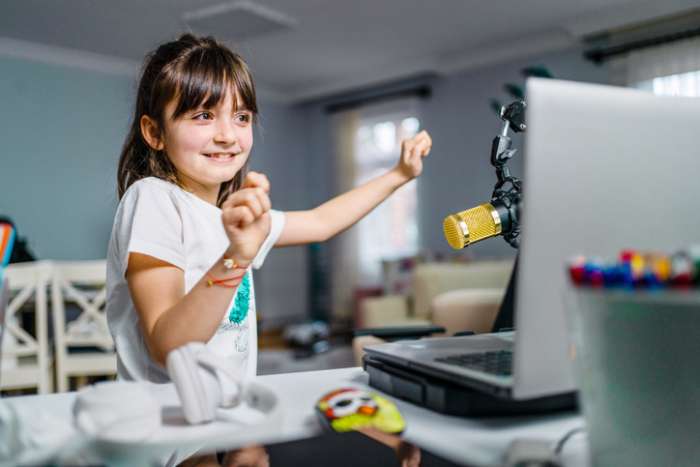I am not a fan of TikTok, but my kids are. But, in truth, I’m not big on social media. I’m in that weird age bubble where I used the internet for research in high school and college, and Facebook and social media began right around when I graduated college. So, I didn’t grow up without the internet, but it wasn’t pivotal to my social development. And, while I have a Facebook account that’s as deep into the social media rabbit hole as I go.
I don’t think there’s anything inherently wrong with social media platforms, but when overused or misused, it contributes to a decline in mental health and real-life social skills and could put young users at risk for online predators, cyberbullying, and access to inappropriate content.
Related: The Problems and Dangers with Posting Kids’ Photos on Social Media
Parenting Influencers and Child Privacy Issues
Social media and electronic use are hotbed issues among parents. There are often two extremes, parents who overshare and provide every little detail of their child’s life and parents who rarely post anything. We see this dichotomy daily among celebrities.
The Kardashians are infamous for oversharing, while parents like Sarah Jessica Parker and Matthew Broderick rarely share any pics of the kids, even from the back. However, other celeb parents like Kristen Bell and Dax Shepherd put rainbows or butterflies over their daughters’ faces when posting.

One of the biggest questions is whether there is any safe amount of social media use for children, and if so, how do protect them when using social media apps like TikTok? In addition, situations like the recent Wren Eleanor story have parents questioning when and if they should post their children on social media.
Defining the Successful Child
Defining the Successful Child A successful child is one who uses her abilities to develop ever-increasing skills that help form the positive personal attributes that will lead her to a successful life. A child's individual abilities make her unique. Read More
I admit, when my kids were babies and toddlers, I posted a lot of videos and pictures, but I also lived far away from friends and family, and it was the easiest way to share updates with a large group. As my children get older, I post less often, particularly my 11-year-old, who frequently asks not to have his picture taken.
Neither of my children has a social media account. And although they use messenger through Roblox to talk to friends and other players, all names are aliases, and no photos are posted. But my kids do enjoy watching TikTok and have asked for YouTube accounts, so I am sure it is only a matter of time before the pressure to have a social media account begins.
What is TikTok?
I don’t have a TikTok account, but my kids love watching TikTok videos of dancers, animals, and funny or cool stunts.
The TikTok app is a free social media app that works on Apple or Android devices and allows users to create, share, and watch short (under 60 seconds) video clips. It is an incredibly popular app with over 1 billion subscribers globally.
TikTok is also popular among musicians, influencers, stunt performers, and athletes as it is a quick and easy way to release content.
TikTok videos are often a fun and silly way for teens to express themselves and share content with their friends. While users must be 13 to create an account, anyone can search and watch videos.
Is TikTok Safe for Kids?

TikTok has taken several steps lately to make its platform safer for minors and to make parents feel comfortable if their kids want to use TikTok.
- Users under 18 automatically have accounts set to private
- The anti-bullying feature helps to prevent cyberbullying by allowing creators to control what comments can be posted. An additional prompt asks commenters to reconsider if the app flags the comment as potentially inappropriate.
- Users 13-15 can set the comments section to “off” or “only friends.”
- Young users, ages 13-15, will automatically have the “suggest your account to others” option turned off.
- Direct messaging is not available for users under 16.
- Anyone over 16 will automatically have the setting to download video content by users under 16 turned off. 16 and 17-year-old users will have the option to change this as it is understood some 16 and 17-year-olds may have friends or family that are younger users. However, this feature should prevent child predators from saving videos of TikTok’s youngest users.
- Parents can set a Bedtime Block, which prevents users from receiving notifications at a specific time. For example, for 13-15-year-olds, the block starts at 9 pm; for 16-17-year-olds, it is at 10 pm.
- Users also have the option to block inappropriate content and report it to TikTok.
- According to TikTok’s Community Guidelines, their algorithms may prevent specific content from being searchable and will remove any content that does not meet their safety guidelines.
While TikTok vehemently proclaims they will penalize those presenting false and harmful information or those who pose as another individual, I could find nothing that would prevent a teen from setting up an account with a fake DOB to override some of the above safety measures. This is where you, as a parent, must step in and monitor your child’s social media use.
How Do I Respectfully Monitor My Child’s TikTok Accounts?

While we as parents want to present our teens with autonomy, the social media and online world are challenging for teens, and our child’s safety sometimes has to come before privacy. Teen suicide and self-harm are at an all-time high, and research points out that social media dramatically affects a person’s self-esteem and mental health.
Depending on the type of phone your child has or the social media accounts they have, there are different ways you can monitor them while giving them a level of privacy.
- Have a list of all their user names, passwords, and passcodes - but only use them if you suspect something is wrong.
- Have them friend you on any social networks you both use. If you need to, set up a Snapchat or TikTok if only to monitor their account.
- Check the privacy settings for each platform and set them at age-appropriate levels. For example, if they have a YouTube account, you can set the content for PG-13 to avoid mature content.
- Use a parental control app. A service like Bark doesn't allow you to see what your child is posting, emailing, or texting, but it will alert you to potential dangers. For example, if a message contains wording that flags as cyberbullying, sexual content, or predatory, you will be able to read that message. You can also set screen time alerts, filter website access, and set location alerts.
- Family pairing tools can link your child’s account to yours. For example, Google Family Link allows you to monitor what your child does online, what apps they use, and set up screen time management.
- Check their phone for privacy settings. Android and iPhones offer different features.
Talk to Your Kids About Online Safety

Talking to your kids about potential dangers online is one of the best prevention methods. I have told my son so many times that he doesn’t share his real name, how old he is, or where he lives so often that I get an eye roll when it happens.
Discussing digital wellbeing and internet safety is as vital as talking about what to do in the event of a fire, rules for staying home alone, and discussing drugs and sex when age-appropriate.
Tips for online safety on social media
- Never share their full name with strangers (user names with aliases are even better). If they have a Facebook account, set it up as “Quinn G.” or Lily Flower.”
- Never accept a friend requests from someone they don’t know personally.
- Never send pictures to someone they don’t know.
- Never post or send inappropriate pictures to friends or online - once it’s out there, it’s out there for good.
- Never share or post their phone number, address, or even town where they live.
- Set accounts to private account mode so only people they know can contact them.
- Never share their age, school, or grade.
- Never click on links sent to them.
Set boundaries with your children when using social media with established consequences; that way, they know exactly what to expect if they violate a boundary. For example, “I will randomly check your account; it could be once a week, or once a month. However, you will lose access for one week if I see inappropriate or offensive language or content.”
Ultimately how much privacy you allot your child and how much access to social media you allow will depend on various factors. You know your child best and must decide which steps are most needed. First, become familiar with their devices and apps' various safety features and parental consent options. Second, have frank discussions with them about your privacy concerns. Lastly, remember you are the parent, and as much as they want online privacy from you, they are still minors, and it is your job to protect them.
For more tips on protecting your kids’ data on TikTok and other social media sites, check out these 5 Things Every Parent Should Do Before Your Kids Join Social Media.



